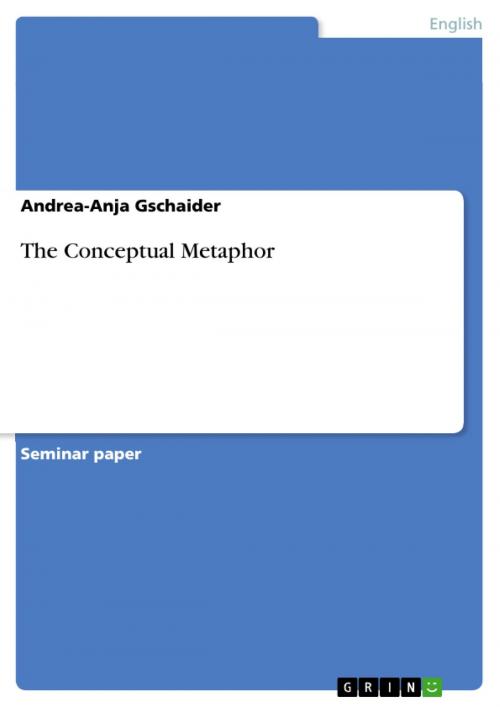| Author: | Andrea-Anja Gschaider | ISBN: | 9783638518840 |
| Publisher: | GRIN Publishing | Publication: | July 9, 2006 |
| Imprint: | GRIN Publishing | Language: | English |
| Author: | Andrea-Anja Gschaider |
| ISBN: | 9783638518840 |
| Publisher: | GRIN Publishing |
| Publication: | July 9, 2006 |
| Imprint: | GRIN Publishing |
| Language: | English |
Seminar paper from the year 2002 in the subject English Language and Literature Studies - Linguistics, grade: 1,3, Ruhr-University of Bochum, course: Hauptseminar Linguistik, 18 entries in the bibliography, language: English, abstract: Classical theorists since Aristotle have referred to metaphor as an instance of novel poetic language in which words likemother, night,andgoare not used in their normal everyday meaning. Metaphor was considered as a matter of language, not a matter of thought. It was assumed that in everyday language, there was no metaphor, and that metaphor used mechanisms which were not used in conventional language. This theory was taken as a definition. The wordmetaphorwas defined as a linguistic expression in which one or more words for a concept are used outside of the conventional meaning to express a similar concept. From a linguistic point of view, one has to ask what these generalizations governing the linguistic expression are. Trying to answer this question, the classical theory turns out to be false: the generalizations are not in language, but in thought; they can be seen as general mappings across conceptual domains. These conceptual mappings do not only apply to poetic expressions but also in everyday language. As a result, metaphor is a central aspect of ordinary language semantics. Everyday metaphor consists of a large number of cross-domain mappings which are used in novel metaphor. So when studying literary metaphor, it is an extension of the study of everyday metaphor. This paper will also show that the idea of metaphor is not limited to linguistics, but also concerns many areas of life and how we understand the world.
Seminar paper from the year 2002 in the subject English Language and Literature Studies - Linguistics, grade: 1,3, Ruhr-University of Bochum, course: Hauptseminar Linguistik, 18 entries in the bibliography, language: English, abstract: Classical theorists since Aristotle have referred to metaphor as an instance of novel poetic language in which words likemother, night,andgoare not used in their normal everyday meaning. Metaphor was considered as a matter of language, not a matter of thought. It was assumed that in everyday language, there was no metaphor, and that metaphor used mechanisms which were not used in conventional language. This theory was taken as a definition. The wordmetaphorwas defined as a linguistic expression in which one or more words for a concept are used outside of the conventional meaning to express a similar concept. From a linguistic point of view, one has to ask what these generalizations governing the linguistic expression are. Trying to answer this question, the classical theory turns out to be false: the generalizations are not in language, but in thought; they can be seen as general mappings across conceptual domains. These conceptual mappings do not only apply to poetic expressions but also in everyday language. As a result, metaphor is a central aspect of ordinary language semantics. Everyday metaphor consists of a large number of cross-domain mappings which are used in novel metaphor. So when studying literary metaphor, it is an extension of the study of everyday metaphor. This paper will also show that the idea of metaphor is not limited to linguistics, but also concerns many areas of life and how we understand the world.















